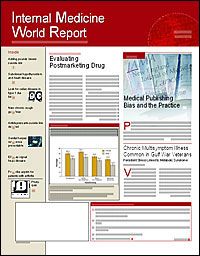Publication
Article
Internal Medicine World Report
Perioperative Amiodarone Prophylaxis Reduces Postoperative AF
Author(s):
Atrial fibrillation (AF), the most frequent complication after cardiac surgery, is a drain on both the health care system and the health of the patient. The largest study to date of prophylaxis has now demonstrated that perioperative antiarrhythmic therapy is an effective and well-tolerated method of reducing the likelihood of postoperative atrial tachyarr?hythmia (JAMA. 2005; 294: 3093-3100).
The trial, dubbed PAPABEAR (Prophylactic Amiodarone for the Prevention of Arrhythmias that Begin Early After Revascularization, Valve Replacement, or Repair), recruited 600 predominantly male patients (average age, 61 years) who were scheduled for nonurgent coronary artery bypass graft (CABG) surgery and/or valve replacement or repair surgery between February 1999 and September 2003.
Key points
Up to 50% of patients suffer atrial tachyarrhythmias after cardiac surgery.
13-day perioperative amiodarone Rx reduces postoperative AF by 50%.
Consider amiodarone prophylaxis for patients facing elective cardiac surgery.
Patients were randomly assigned in a double-blind fashion to oral amiodarone HCl (Cordarone, Pacerone), 10 mg/kg daily, or placebo for 6 days before and 6 days after surgery.
A total of 137 patients had a postoperative atrial tachyarrhythmia, primarily (93.4%) AF. Amiodarone reduced the incidence of atrial tachyarrhythmias in all patients, regardless of age, type of surgery, or use of preoperative beta-blocker therapy (Table).
On the downside, full-dose blinded therapy was withdrawn or titrated down twice as often in amiodarone patients than in placebo patients.
The incidence of sustained ventricular tachycardia was lower in the amiodarone group than in the placebo group (0.3% vs 2.6%; P = .04), and there was a trend toward shorter hospital stays with amiodarone, although the difference was not significant.
In an accompanying editorial (pages 3140-3142), Mihai V. Podgoreanu, MD, and Joseph P. Mathew, MD, both of Duke University Medical Center, Dur?ham, NC, highlighted the importance of the PAPABEAR investigators stratifying their randomization by age, type of surgery, and preoperative beta-blocker use?all of which have been identified as factors influencing the occurrence of postoperative atrial tachyarrhythmias.
"Among patients aged 65 years or older, those having valve replacement/re?pair surgery combined with [CABG] surgery and those not receiving preoperative beta-blocker therapy, larger absolute reductions in the incidence of atrial tachy?arrhythmias were evident with amioda?rone prophylaxis," the editorialists wrote.
Dr Mathew told IMWR that physicians should "be aware of the need to monitor QT interval prolongation" during therapy, adding that amiodarone therapy is not for everyone. "It is typically not given to pa?tients with bradycardia, second- or third-degree atrioventricular block, prolongation of the QT interval, or restrictive lung disease such as pulmonary fibrosis." He said that pulmonary fibrosis "probably is a relative contraindication, since the duration of therapy with amiodarone before and after surgery would be limited."
Beta-blockers are the other class of drugs that have been consistently shown to lower the risk of postoperative AF, Dr Mathew noted. "Despite this, only 50% of cardiac surgical patients are typically treated with beta-blockers, and in 25%, beta-blockers are actually withdrawn. Although there is a wealth of data supporting their use, many surgeons are hesitant to use beta-blockers postoperatively because of the potential for bradycardia and decreases in cardiac ?output." Amiodarone tends to be preferred, he said, "because it does not impair cardiac function."
While adding that only future research can determine the wisdom of deliberately de?laying surgery to allow the administration of perioperative prophylaxis, Drs Pod?gor?eanu and Mathew concluded that "in the meantime, to help prevent post?operative atrial fibrillation, more widespread use of ami?odarone for patients undergoing elective cardiac surgery should be considered."





